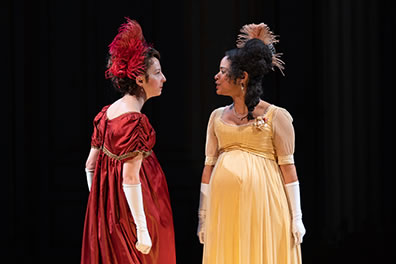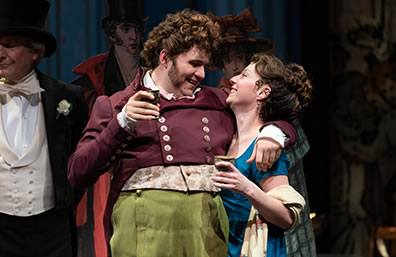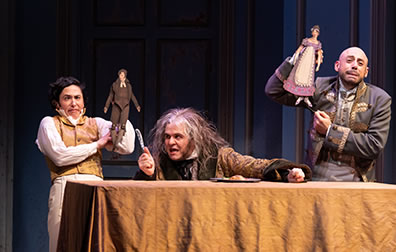Vanity Fair
Blinded By the Dark
By Kate Hamill, based on the novel by William Makepeace Thackeray
Shakespeare Theatre Company, Lansburgh Theatre, Washington, D.C.
Wednesday, March 6, 2019, G–106&107 (center stalls)
Directed by Jessica Stone

Becky (Rebekah Brockman, left) and Amelia (Maribel Martinez) face off before resorting to fisticuffs even as their husbands have just left for the Battle of Waterloo in Kate Hamill's adaptation of William Thackeray's Vanity Fair at the Shakespeare Theatre Company. Photo by Scott Suchman, Shakespeare Theatre Company.
I have seen the future of live theater. Unfortunately, I was watching it from the past.
We are sitting a half-dozen rows from the Lansburgh Theatre stage watching the Shakespeare Theatre Company's production of Vanity Fair, Kate Hamill's enticingly agile adaptation of William Makepeace Thackeray's 1847–1848 serialized novel. Hamill's own stamp on the story is Shakespearean in scope and texture, combining with Thackeray's plot and themes to make enlightening, in-the-moment theater. Except that we, the audience, are not in that moment; we are left in the dark.
Hamill has become one of the it playwrights of this century with her adaptations of 19th century literature. Her take on Jane Austen's Sense and Sensibility premiered in a New York black box theater in 2014 and became an instant classic: the production was revived shortly after its initial run and repeatedly extended for almost a year. It's already become a staple in regional theaters, including playing at the Folger Theatre here in Washington, D.C. Her adaptation of Austen's Pride and Prejudice debuted at Hudson Valley Shakespeare in the summer of 2017 before shifting to New York City's Cherry Lane Theater for the winter. She also adapted Austen's Mansfield Park, which premiered last fall in Chicago's Northlight Theatre. Her treatment of Vanity Fair debuted at New York City's Pearl Theater in the spring of 2017, and she'll bring Louisa May Alcott's Little Women to New York's Primary Stages this summer.
Hamill's motivation for these adaptations is simple: an accomplished actor, she wanted to play more complex female characters in female-driven plays than has generally been available in American theater. Greek and early-modern classic plays have pretty much provided the only such work for women, and those opportunities are limited, so Hamill turned to the women telling their own stories in 19th century novels. In Vanity Fair, she gets to work with two fascinating women residing at opposite ends of social female propriety, Becky Sharp the slut (the role Hamill originated in the Pearl Theater production) and Amelia Sedley the clueless romantic. Yes, I'm using sexist labeling because Thackeray and Hamill after him draw on those stereotypes in their narratives only to blow them up. Such labeling, prevalent in Regency society (Vanity Fair's setting) and Victorian society (when Thackeray wrote the novel) and prevailing today (Hamill's lifetime) disintegrate in the crucible of humanity.
Thackeray's subtitle for Vanity Fair is "A Novel without a Hero." If Hamill's two lead female characters come off as heroic, it's only because we understand the odds they have to overcome to merely survive let alone "make their way in this world," as Becky says. Becky (Rebekah Brockman), the orphaned daughter of a French opera singer (scandalous!) uses her wit and wiles to ingratiate herself in wealthy society and snare a husband. Her foundational motivation is survival. "With no husband, I have nothing," she cries with an anger born of frustration. A husband is her only means of protection as well as advancement. And who doesn't want to advance if they can grab the chance? There's no sin in that, right? Becky sees no end to how far she would like to advance, and she decides to use the rules society plays by rather than those society assigns her as a woman of a lower class.
You can call Becky a protofeminist, both in Thackeray's and Hamill's portrayals, but both writers make clear that she is in this life only for herself: She doesn't even care about her only son. Her schemes and flirtations put her in direct competition with other women, including her "only friend," Amelia. Becky tiptoes the line of prostitution, but whether she crosses it is unclear, though at play's end she admits she's done things unimaginably shameful. In her conversations and asides, she comes off as a realist, especially in comparison to Amelia's inability to grasp reality, but Becky's own miscalculations and selfishness send her story arc on a downward spiral, landing her in the position she initially set out to avoid, without a husband, without protection, without a "way in this world."
Amelia (Maribel Martinez) was the only girl at school to befriend Becky. Why Amelia did so is not clear, because Becky is shown to have a mean wit from the very start while everybody adores Amelia. Amelia is such a sweet-hearted woman that she sees good in all things, especially in her drunken, scourge of a husband, George Osborne (Alyssa Wilmoth Keegan). Born to upper middle-class comfort, Amelia ends up impoverished by her stockbroker father's downfall, and when she marries George, he is disinherited. The true love of Amelia's life is Captain William Dobbin (Anthony Michael Lopez), but Amelia is so blinded by her total but unfounded devotion to George, even after he's killed at the Battle of Waterloo. Though their son, young George, becomes the new focus of her life, Amelia ends up in such a poor state that she turns the child over to George's father for raising. She loses access to her son, but she gets a pension in her father-in-law's will that finally returns her to financial security.
The women's friendship frays on the eve of Waterloo when Becky and Amelia, both pregnant, accompany their husbands as their regiment moves to Brussels. Becky, married to—and slyly assisting—cardsharp Rawdon Crawley (Adam Magill), openly flirts with George and even entertains a potential tryst with him (she ends up literally holding the card that finally convinces Amelia to shed herself of her devotion to George at the end of the play). While the men are off stage fighting one of the most famous battles in history, the two pregnant women duke it out on stage. Irony aside, this scene of fisticuffs seems an unnecessary insertion: their conflicted emotions toward each other already is richly presented in the text, and the scene's comedy quotient is questionable. But what actor writing her own script will pass up a chance to engage in stage combat?
The dual plots of these two women run parallel courses and sometimes weave through each other. At times, their individual scenes are staged as juxtapositions, their lines even blending. Thackeray used a puppet show and narrator as a framework for his novel, and Hamill turns the narrator into the Stage Manager (Dan Hiatt) in the tradition of Thornton Wilder's Our Town. The twinkle-eyed Hiatt presents the Manager as a commentator on society's morality morass that people disguise as social order. "How many sins do we overlook to have our desire?" he asks us. Both Amelia and Becky transition between the worlds of their play into conversations with the Manager as he warns both about the consequences of their behaviors. Each woman also speaks a soliloquy pointedly challenging the audience's assumptions about their morality, Becky stressing her practicality, Amelia defending herself on the grounds of good conscience.
Hamill crafts her compositions of character and dialogue with focused thematic resonance, but just as important is her vision of how this should be staged. Her aesthetic sensibilities are a product of the Ken Tucker-led Bedlam theater company based in New York, which relies on small casts and fluid theatricality. Tucker never met a play space he couldn't manipulate in order to explode our expectations: Reviewed on Shakespeareances.com are his 2014 Hamlet and Saint Joan, his dual Twelfth Night in 2015, and the 2016 production of Hamill's Sense and Sensibility. Even when Tucker staged the latter at the Folger, he turned the library's venerable theater into a dynamic play space, with much of the action taking place among the audience while the set, all the furniture on rollers, moved in perpetual motion on the stage. Tucker also directed Hamill's Vanity Fair at the Pearl.
This production of Vanity Fair at least abides by the script's call for a small cast. Only Brockman as Becky and Martinez as Amelia play single roles. Hiatt's Manager takes on the roles of the sarcastic old gossip and scandal monger Matilda Crawley; the English regimental general; and Lord Steyne, who becomes the equivalent of Becky's upper crust pimp. The rest of the cast is identified as Actor Two, Actor Three, Actor Four, and Actor Five. Each transition from role to role throughout the play with quick changes, sometimes on stage—sometimes even merely holding up an article of clothing while speaking a line or two. Rawdon's older brother and stepmother are stick puppets managed by Keegan and Lopez, respectively.
Jessica Stone, who directs this production, acknowledges the debt Hamill's script pays to Bedlam's staging techniques. In her director's notes, Stone remarks how Bedlam has "become justly renowned in the industry for putting shows on with a minimum of scenery, smaller casts, but a maximum of fun and theatrical imagination." Her challenge was translating the play to a larger space, the 451-seat Lansburgh and the 1,040-seat Geary Theater, home to the American Conservatory Theater in San Francisco, California, where this production is heading after its D.C. run. Her answer is to stage the play in the framework of a Victorian burlesque, a form of entertainment combining traditional theater with English music hall tropes. Geared toward audiences from the lower and middle classes, "These scrappy companies would lampoon literary works with the aid of music and playful, metatheatrical sensibility that still took advantage of beautiful painted scenery," Stone writes. "The principal element of Victorian burlesque is the perception of something beautiful right next to the ragged reality."


Top, Becky (Rebekah Brockman) flirts with Jos Sedley (Vincent Randazzo) in Kate Hamill's Vanity Fair at the Shakespeare Theatre Company. Dan Hiatt is the tuxedo-clad Manager to the left. Above, Sir Pit Crawley (Randazzo, center) rages as Lesser Pit (Alyssa Wilmoth Keegan, left) and Rose Crawley (Anthony Michael Lopez) quake. Photos by Scott Suchman, Shakespeare Theatre Company.
Scenic Designer Alexander Dodge sets the action in the faded-paint proscenium arch of the "Strand Musick Hall." Scrolling backdrops are rolled on stage for specific settings in the story. Jennifer Moeller's costumes are elaborate, Regency style, including Becky's underwear. A couple of music hall numbers open each act and close the play, with Jane Shaw credited as composer (the Tucker-helmed premiere of this play, used period costume but featured modern pop music to play up the story's 21st century cred). The actors also sometimes perform with farcical hyperphysicality. With the Manager serving as the emcee for the show, the burlesque framework proves a tidy medium for Amelia and Becky to move back and forth between the fantasy world of the play and the reality of the theater. "I wanted to create a world as flexible, as playful, and as purely enjoyable to spend time in as the writing," concludes Stone's notes.
She may have created such a world for her actors and their characters, but the audience is not allowed to mingle in the psychological realm of the play. Though the script includes direct address to individual members of the audience—by Becky and Amelia as well as the Manager—the fourth wall yet proves impenetrable because the house lights go dark for the performance. If ever a production needs universal lighting, it's this one. Hiatt does pinpoint second-row patrons in a couple of his Manager's speeches, but otherwise the actors speak to shadows in the dark. In her soliloquy, Amelia directs a question to the empty seat next to me; though she speaks her lines earnestly, I keep thinking, "she's talking to an empty seat."
This is no small thing because it's an archaic thing. I would say its backward thinking, but William Shakespeare used universal lighting in his theaters. Current Shakespeare practitioners who have worked in his original staging conditions—Hamill, by virtue of Bedlam, among them—have discovered how much more dynamic his plays become when the dialogue as well as the asides and soliloquies directly engage individuals in the audience instead of playing to the exit signs or empty seats. When you engage one, you engage all. This practice is spreading across the theater scene. Last year when I attended 71 plays at 50 theaters across the North American continent for the Shakespeare Canon Project, the majority of productions I saw used universal lighting, at least in part. The majority also expanded the physical action into the audience. Hamill's Vanity Fair begs for this, but in this Lansburgh staging the actors run up against an invisible wall of darkness at the apron of the stage.
The company on stage at least play their space well. This is a strong ensemble, with a few performances in particular standing out. Brockman plays every facet of the moissanite diamond that is Becky Sharp; there's a lot to not like about this self-centered, scheming woman, but her charms so work on us that we root for her success. Martinez manages to make Amelia's ever-dream-eyed state sincere without ever becoming sappy. Lopez's portrayal of Dobbin breaks our hearts. Even when he finally attains the love of Amelia, we can't help feeling bad for the years he lost before she finally accepted her own truth. Vincent Randazzo delivers two sublimely comic performances in the pathetic lout Jos Sedley, Amelia's thickheaded and thick-waisted brother, and as the crass baronet Sir Pitt Crawley.
Then there's Hamill's performance, not as an actor but as writer. As much as we are watching this cast perform, we are watching Hamill's sense of theatricality perform. Her script, with a volatile personality of its own, peers through Thackeray to engage with the women and their social fates of 200 hundred years ago. It's not that nothing has changed for women in that time—much obviously has; it's that women in both worlds are facing the same societal labels and imposed morals that are as disenfranchising now as they were then. Hamill gathers this sisterhood into her script as a living, two-century-dimensional portrait engaging directly with us.
Then it's put behind a wall, a transparent one, true, but so are the walls separating us from museum exhibits. Existing as a cool historical tableau in a display case, Vanity Fair is fun to look at and interesting to ponder, but Becky, Amelia, and Hamill are crying to connect.
Eric Minton
March 8, 2019
Comment: e-mail editorial@shakespeareances.com
Start a discussion in the Bardroom



 Find additional Shakespeareances
Find additional Shakespeareances